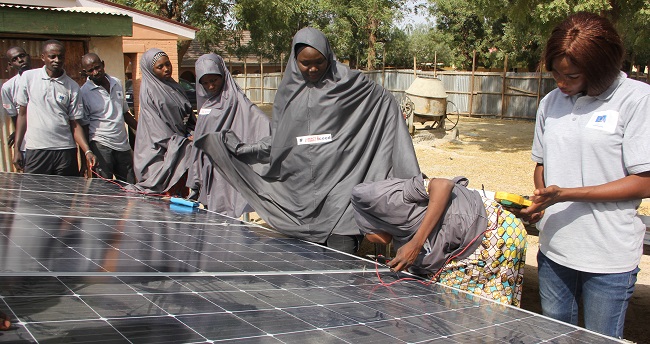To address inherent socio-economic and energy-related gaps, the International Centre for Energy, Environment and Development (ICEED), in partnership with Mercy Corps and funding from the European Commission, is implementing a project aimed at strengthening resilience and improve the livelihood of people in six of the local government areas (LGAs) affected by the insurgency in Borno State, northeast Nigeria.

Some 140 young men and women are being trained on solar installation and business under the initiative, even as the training of the first 24 solar technicians out of the targeted 140 was recently concluded.
The training, which combined intensive classroom and practical activities, was conducted at the Borno State Vocational Training Centre in Maiduguri, the state capital. Five young women were among the graduated solar technicians.
Also under the project, some health and educational facilities, as well as households in these locations will be equipped with solar energy kits to reduce protection risks for women and children and reduce gaps in services resulting from energy deficiencies. In providing the installations, the trained solar technicians will be actively involved, thus enhancing their skills and visibility.
The Principal of the Vocational Centre, Mr. Shettima in his message to the trained technicians, said: “This is an opportunity for you to excel in a trade that has few actors, especially in Borno State. To the young women, I am glad that you have defied the odds and came out of your shell to acquire this training, I implore you to take this as a trade and run with it as there are visible opportunities to earn a living as solar technicians.”
Ewah Eleri, the Executive Director of ICEED, in his remarks said: “I am glad that women in Borno are beginning to get involved in an area that has been the exclusive preserve of men. Solar energy offers a win-win situation for anybody that wants to get in as an entrepreneur. I am sure in a short while, you will start reaping the benefits of this training.”
Access to electricity is vital to improved livelihood, according to experts. In Nigeria however, this is often highly constrained, and more exacerbated in conflict-affected areas. A research conducted by ICEED in 2018 on the level of satisfaction with the public power supply in six LGAs of Borno State shows that 62% of respondents were dissatisfied with the level of public power supply to homes.
Solar energy as an alternative energy solution, as well as solar technicians, is almost nonexistent in conflict affected communities of Borno State. Solar energy business has been, and continues to be, a male-dominated field, leaving women out of the livelihood track, according to ICEED.
